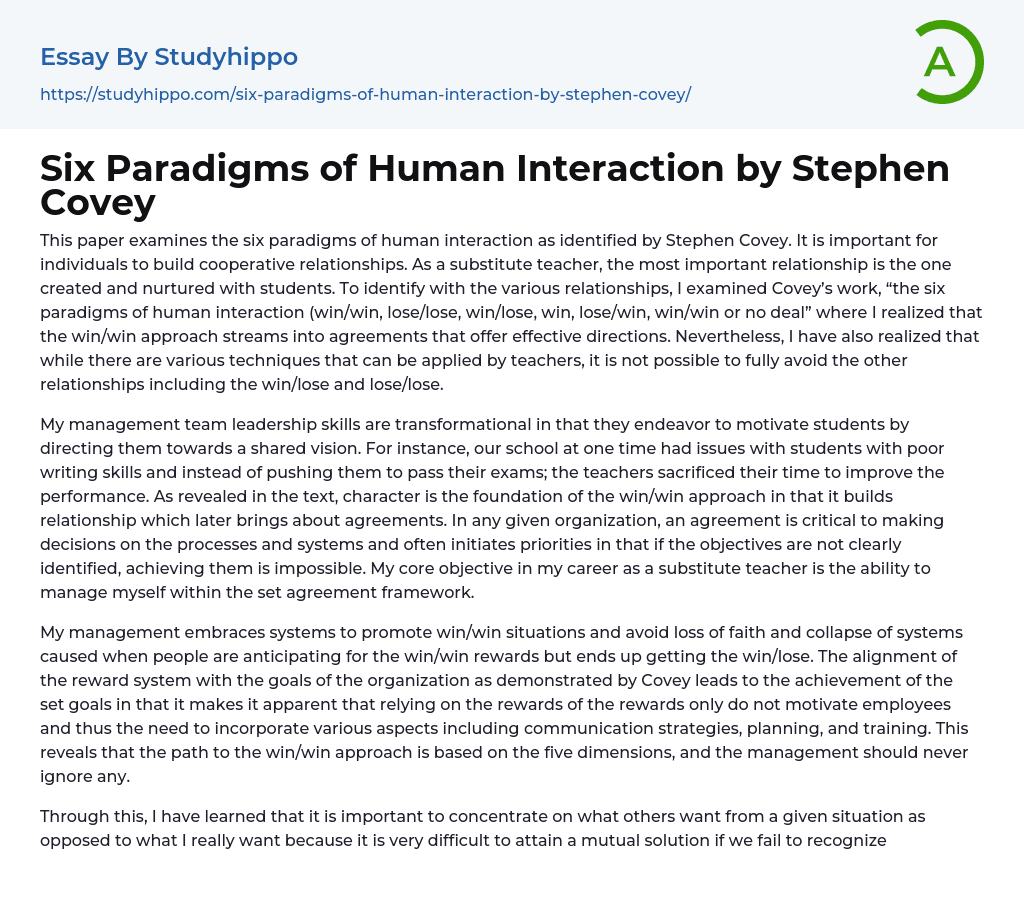

Six Paradigms of Human Interaction by Stephen Covey Essay Example
This paper examines the six paradigms of human interaction as identified by Stephen Covey. It is important for individuals to build cooperative relationships. As a substitute teacher, the most important relationship is the one created and nurtured with students. To identify with the various relationships, I examined Covey’s work, “the six paradigms of human interaction (win/win, lose/lose, win/lose, win, lose/win, win/win or no deal” where I realized that the win/win approach streams into agreements that offer effective directions. Nevertheless, I have also realized that while there are various techniques that can be applied by teachers, it is not possible to fully avoid the other relationships including the win/lose and lose/lose.
My management team leadership skills are transformational in that they endeavor to motivate students by directing them towards a shared vision. For ins
...tance, our school at one time had issues with students with poor writing skills and instead of pushing them to pass their exams; the teachers sacrificed their time to improve the performance. As revealed in the text, character is the foundation of the win/win approach in that it builds relationship which later brings about agreements. In any given organization, an agreement is critical to making decisions on the processes and systems and often initiates priorities in that if the objectives are not clearly identified, achieving them is impossible. My core objective in my career as a substitute teacher is the ability to manage myself within the set agreement framework.
My management embraces systems to promote win/win situations and avoid loss of faith and collapse of systems caused when people are anticipating for the win/win rewards but ends up getting the win/lose. The alignment of the
reward system with the goals of the organization as demonstrated by Covey leads to the achievement of the set goals in that it makes it apparent that relying on the rewards of the rewards only do not motivate employees and thus the need to incorporate various aspects including communication strategies, planning, and training. This reveals that the path to the win/win approach is based on the five dimensions, and the management should never ignore any.
Through this, I have learned that it is important to concentrate on what others want from a given situation as opposed to what I really want because it is very difficult to attain a mutual solution if we fail to recognize the desires of others. This knowledge is very important in my life as a teacher as I can use it to embrace certain situations and walk away from others if they seem like ineffective approaches such as lose/lose, win/lose or lose/win.
Effective people, as Covey, reveals employ the win/win strategy. In most cases, teachers are perceived by the students to apply these strategies as they interact. Use of unfavorable strategies such as, lose/win, lose/lose, win/lose, and win are likely to produce outcomes that are undesirable in the education environment. For instance, in the school setting, it is hard to see teachers winning arguments with their students. However, as Covey demonstrates, the use of the suitable strategy (win/win approach) allows both students and teachers to achieve the common instructional success in that students who perceive their teachers as concerned by truly investing in their well-being are more likely to meet the set expectations as well as the standards for succeeding performance. Win/win
is a practice of interpersonal leadership in that it entails the application of the human endowments including an independent will, imagination, and self-awareness and at the same time involving mutual influence and benefits.
Discussion
The Key Elements of the Scenario:
- Cooperation;
- Sharing of ideas;
- Competition;
- Benefiting from each other;
Competition makes it apparent that players should concentrate on their needs if they desire to win the popular award. However, if they focus on themselves, they lack time to think of others, an act that not only hinders competition but also empathy. While some people may, for instance, argue that competition is a motivator in a classroom setting, they fail to realize that it often sets up unfair and demeaning comparisons and through comparing students to their peers, judgments and labels are promoted. The desire to work hard and perform well in all dimensions including school ought to be intrinsic. For cooperation, sharing of ideas and benefiting from each other, I often encourage my students make efforts rather than compete in that they are all equal in the sense that while some are good in some subjects, others are good in others. Thus, those who try, and participate are all perceived as winners.
- Acceptance essays
- Age Of Enlightenment essays
- Child Observation essays
- Confucianism essays
- Conscience essays
- Critical Reflection essays
- Destiny essays
- Determinism essays
- Empiricism essays
- Environmentalism essays
- Epistemology essays
- Ethics essays
- Ethos essays
- Existence essays
- Existentialism essays
- Fate essays
- Free Will essays
- Functionalism essays
- Future essays
- Good And Evil essays
- Human Nature essays
- Individualism essays
- Meaning Of Life essays
- Metaphysics essays
- Natural Law essays
- Personal Philosophy essays
- Philosophers essays
- Philosophy Of Life essays
- Political Philosophy essays
- Pragmatism essays
- Reality essays
- Relativism essays
- Teaching Philosophy essays
- Time essays
- Transcendentalism essays
- Truth essays
- Utilitarianism essays
- Attitude essays
- Goals essays
- Personal Goals essays
- Personal Life essays
- Personality essays
- Principles essays
- Reputation essays
- Self Awareness essays
- Self Esteem essays
- Self Reflection essays
- Self Reliance essays
- Strengths essays
- Value essays



